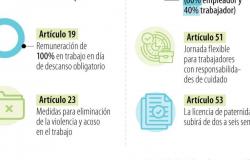The Economist Daniel Artana expressed that there are still no strong signs of a recovery in the level of activity, due to the deep drop in consumption and the lack of clear signs of investment.
“The drop in the check tax and internal VAT allows us to anticipate that activity has not yet rebounded. There are still no signs of recovery, because consumption declines a lot and the same thing happens with investment,” he said in an interview with Infobaethe chief economist of the Latin American Economic Research Foundation (FIEL).
This is observed, among other indicators, in the great decline in the collection of taxes such as bank debits and credits (check) and VAT during April and May. According to Artana, market noise – both in the exchange rate and in bonds and stocks – will delay the rebound in the level of activity.
— Are there strong signs of an incipient recovery?
— Market noise generates more uncertainty about the inflation rate due to the widening gap. This obviously does not help and you also need to resolve it soon, because at some point next year you will have to place some debt on the international market to renew a part of the capital that matures, since in 2025 there are maturities of USD 17,000 million. Of that amount, in foreign currency, multilateral organizations will be able to finance you 5,000 million or 6,000 million, so there is still a hole that is difficult to cover with a fiscal surplus. We are talking about two points of GDP. With a lower level of country risk it would be simpler, but for now it is complicated.
— And why do you think it got complicated?
—There was some impact from the Central Bank’s lower interest rate and the political noise in recent weeks. There is also the discussion about how much the field is liquidating, because you are accumulating fewer reserves than expected for this month. There was some postponement, but not so much due to less harvest, but rather due to price. Taking out the years of drought, the price is worse than expected for this year and that can be worrying, because it could last longer than desirable. It is true that the field can stock a part and sell at another time, but not all. There are two other factors that are the problems of the swap with China and the negotiation with the IMF, but I think they are less relevant than the rest. It seems to me that the main thing is the political question. In recent weeks, several events have coincided: the Government was weakened by the food issue, lost the banner of the fight against corruption and showed little ability to manage.
— And the problems in the Cabinet?
—Of course, to this we must add the removal of the Chief of Staff, Nicolas Posse, which is not a minor issue; It is not the same that an undersecretary leaves than that the chief of staff leaves. In addition, there is the delay in the Bases law in the Senate, with tug-of-war that never ends, and pension populism in the Chamber of Deputies, which It is shameful to try to change the pension adjustment formula. That was a sin on the part of the Government, because it did not take advantage of the opportunity to raise the underlying issue regarding pensions. There are several issues to clarify there, such as the retirement age, the difference between men and women and the lengthening of life expectancy. The Government cannot argue that this increase in spending could be offset by lowering tax exemptions, because clearly Congress has gone in the opposite direction with the fiscal package and pensions. That is a complicated signal, because to move Argentina from a country with chronic fiscal deficit and a privileged economy to an economy with fiscal balance and market-oriented, it does not take just one man, a prophet, but a part of the Argentine political leadership that has the ability to vote on things in Congress. All this generates a lot of noise.

— Does the improvement in May collection indicate that the level of activity may be rebounding, or does the fact that taxes linked to consumption still not allow us to draw that conclusion?
— Activity is still not good and there is no need to take seasonally adjusted monthly measurements because they may show certain errors; It is better to take several months together. Therefore, I would wait to see what the official indicators for May and June give for a more precise diagnosis. I understand the Government’s anxiety to give good news, but if one watches the film one must consider what was done last year by promoting an advance in consumption with the exchange rate delay.
— Does the drop in the check tax allow us to anticipate that activity has not yet rebounded?
— Yes, the drop in the check tax and the internal VAT allow us to anticipate that activity has not yet rebounded. There are no signs of recovery because consumption declines greatly and the same thing happens with investment.
— What needs to happen for the economy to rebound?
— The adjustment to income was very strong, but retirements have already begun to recover in real terms after the decline in the first quarter. Added to this are some joint ventures and the fact that in the labor market there was a greater drop in income than in jobs; If you look at the figure of 100,000 or 150,000 layoffs, it is a low figure compared to the total labor market, although it is painful for those who are laid off. So consumption has not yet recovered and investment basically depends on construction and durable goods. And neither of them show positive indicators.
— Can the RIGI promoted by the Government have any traction?
— Yes, but that takes time, from the time the law is passed until the projects are launched. In any case, I don’t like the regime, it has several problems; First, the main obstacles currently for investment have to do with the lack of possibilities to move money, such as dividends. The other obstacle is the delay in the VAT refund, of three or four years, which makes any project more expensive. On the other hand, it exempts you from paying withholdings for a time and that does not seem reasonable to me. I think that the reality of each of the sectors was not taken into account; In short, I think it is poorly thought out and poorly designed.






